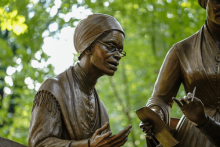In 1851, Sojourner Truth asked a simple question: "Arn't I a Woman?" That question, though 150 years old, turned my world upside down.
Feminism

Mujerista may not be a familiar term yet, but theologians and others are starting to pay more attention to the voices of Latinas in this country and elsewhere
Many Americans are treading into the 21st century riddled with spiritual trepidation. Women’s uncertainty is often shaped by gender issues wrought with difficult choices about where to stand in relation to their religious communities: Be silent? Be radical? Be a reformer? Be a dissenter? Mary Farrell Bednarowski argues that women’s ambivalence ought not be seen as negative, but as an emerging religious virtue.
Critics may counter that Bednarowski is putting a positive spin on a deplorable situation created by patriarchal systems of religious thinking resistant to change. By her own account, Bednarowski says many women speak of their traditions as an exercise in "inhaling contradictions" and relate to their communities as both insiders and outsiders. Caught in a web of tension, women describe their traditions as simultaneously life-giving and death-dealing, liberating and imprisoning.
If none of this sounds very virtuous, Bednarowski says that’s because ambivalence in any religious context is seldom seen through that lens. In popular usage, she says, "ambivalence connotes the lukewarm attitude, the wishy-washiness, the holding back from full commitment that religious communities preach against." But she contends that women’s ambivalence might be "cultivated" as a creative choice and, at the very least, looked upon as honorable. Creative ambivalence requires critical distance from one’s religious community, yet an appreciation for its deepest insights, Bednarowski says. Such communities often exclude women from positions of public authority and embrace religious symbols, rituals, and theology steeped in patriarchy. But ambivalence, she says, can summon forth women’s creativity and imagination, leading to new visions and perspectives drawn from tradition, experience, and the culture at large.

In the world of the last few decades, work and family patterns have undergone dramatic upheaval.

